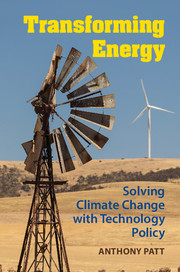Book contents
- Frontmatter
- Dedication
- Contents
- Foreword
- Acknowledgments
- PART 1 SETTING THE STAGE
- PART 2 FAILED STRATEGIES TO REDUCE EMISSIONS
- PART 3 SUCCESSFUL STRATEGIES TO MOVE US AWAY FROM FOSSIL FUELS
- 7 Theories of transitions
- 8 Strategic technologies
- 9 Energiewende in the German power sector
- 10 Policies beyond power
- 11 Pulling it all together
- Notes
- Index
7 - Theories of transitions
from PART 3 - SUCCESSFUL STRATEGIES TO MOVE US AWAY FROM FOSSIL FUELS
Published online by Cambridge University Press: 05 July 2015
- Frontmatter
- Dedication
- Contents
- Foreword
- Acknowledgments
- PART 1 SETTING THE STAGE
- PART 2 FAILED STRATEGIES TO REDUCE EMISSIONS
- PART 3 SUCCESSFUL STRATEGIES TO MOVE US AWAY FROM FOSSIL FUELS
- 7 Theories of transitions
- 8 Strategic technologies
- 9 Energiewende in the German power sector
- 10 Policies beyond power
- 11 Pulling it all together
- Notes
- Index
Summary
I remember clearly the moment when the Internet became established. Exactly twenty years ago, in 1995, I was a young American in search of life experience, about to fly to Switzerland for a three-month stint working on an organic mountain farm. I had the crazy idea to keep in contact with my parents in Boston with a new technology: email. My mother already sent and received email at her office because she worked at a university with a computer system linked to the Internet. But outside of universities and government research labs, email was almost unheard of. I bought a book (Internet for Dummies) that explained to me how I could use my notebook computer and a modem to connect to the Internet anywhere in the world. In Switzerland, after the cows had been milked each evening, I dialed in to a CompuServe access number in Zurich, spent a few minutes exchanging a single set of emails with my family, reading them after I had closed the telephone connection. Within about a year, everyone else I knew was doing the same thing. No tax on postage stamps could ever have killed the handwritten letter as quickly.
More and more people have started to equate climate change with a need for an energy system transition, something like the transition from letters to email or the transition from horses to cars that I alluded to in the previous chapter. Promoting the idea of such a transition has become common sense, and something that nobody would argue against, just like nobody argued against “sustainable development” a decade ago. But, as with sustainable development, the term energy system transition can be so imprecise as to be devoid of useful meaning. One crucial task is to give the idea of an energy system transition an actual meaning, something that is well enough defined to be able to say what it would be and what it wouldn't.
- Type
- Chapter
- Information
- Transforming EnergySolving Climate Change with Technology Policy, pp. 151 - 175Publisher: Cambridge University PressPrint publication year: 2015



